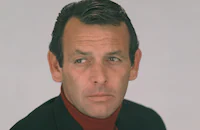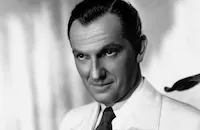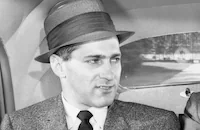King of the Roaring 20's--The Story of Arnold Rothstein

Brief Synopsis
Cast & Crew
Joseph M. Newman
David Janssen
Dianne Foster
Mickey Rooney
Jack Carson
Diana Dors
Film Details
Technical Specs

Synopsis
Despite a decent upbringing by devout Jewish parents, Arnold Rothstein is destined for a life of crime. A born gambler, he is always on the lookout for quick money. By the time he reaches manhood, he is well enough known in New York City to attract the attention of "Big Tim" O'Brien, a crooked politician who establishes him in a gambling house. After duping his partner, Jim Kelly, into selling his half of the business, Rothstein marries Broadway actress Carolyn Green. But domestic life has no appeal for Rothstein, and he devotes most of his time to gambling and plotting the downfall of his lifetime enemy, Phil Butler, a corrupt police official. In the end, Rothstein tricks his childhood friend, Johnny Burke, into revealing Butler's record of graft to a newspaper. Though Johnny is shot down by gunmen, Rothstein, aided by attorney Tom Fowler, succeeds in sending Butler to the chair. His underhanded and vicious tactics not only cause Carolyn to leave him, but they also arouse the wrath of the underworld. One night, while playing poker in a hotel room, Rothstein is killed by paid assassins. His last hand is the one he dreamt of all his life--a royal flush.

Director

Joseph M. Newman
Cast

David Janssen

Dianne Foster

Mickey Rooney

Jack Carson

Diana Dors

Dan O'herlihy

Mickey Shaughnessy

Keenan Wynn

Joseph Schildkraut

William Demarest

Murvyn Vye

Regis Toomey

Robert Ellenstein
Teri Janssen
Jim Baird
Tim Rooney
Crew
Samuel Bischoff
Ralph Butler
Jill Campbell
David Diamond
Agnes Flanagan
Marty Greco
Carl Guthrie
Joseph Kish
David Milton
Edward Morey Jr.
Ted Mossman
Milt Olsen
Lindsley Parsons Jr.
Charles Schelling
Norah Sharpe
Allan Snyder
Jo Swerling
Billy Vernon
Franz Waxman
Roger J. Weinberg
James West
George White

Videos
Movie Clip


Film Details
Technical Specs

Articles
King of the Roaring Twenties: The Story of Arnold Rothstein
Writer Damon Runyon once witnessed a failed attempt on Rothstein's life and later immortalized "the Moses of the Jewish mafia" as Nathan Detroit in a story expanded upon by Jo Swerling and Abe Burrows for the 1950 Broadway musical Guys and Dolls. Rothstein was also the inspiration for William Powell's "Natural" Davis in Street of Chance (1930), for Spencer Tracy's Murray Golden in Now I'll Tell (1934, based on the memoirs of Rothstein's widow) and for Akim Tamiroff's Steve Kalkas in King of Gamblers (1937). F. Scott Fitzgerald used Rothstein as the model for bootlegger Meyer Wolfsheim in The Great Gatsby. It was only after Rothstein had been dead for thirty years that Hollywood dared use his proper name, as a supporting character in The Rise and Fall of Legs Diamond (1960) and as the subject of King of the Roaring 20s: The Arnold Rothstein Story (1961).
Based on Leo Katcher's 1959 nonfiction book The Big Bankroll: The Life and Times of Arnold Rothstein, King of the Roaring 20s belongs to a glut of true crime films produced in the aftermath of Estes Kefauver's televised Senate Special Committee to Investigate Crime in Interstate Commerce. Shot under the working title The Big Bankroll, this Allied Artists release effectively capped the syndicate crime film cycle, which had been kicked off by The Mob (1951) and On the Waterfront (1954) and was inspired in part by the success of the Desilu TV series The Untouchables.
Cast as Rothstein was 29 year-old actor David Janssen. Born David Harold Meyer in Nebraska in 1931, Janssen (the surname came from his stepfather) was a graduate of the Universal Talent School, whose alumni includes the likes of Rock Hudson, Clint Eastwood, John Saxon, Hugh O'Brian, Piper Laurie and Mamie Van Doren. Dropped as a contract player by Universal in 1956 (Eastwood and Burt Reynolds had been dismissed the previous October), Janssen rebounded as the star of the CBS series Richard Diamond, Private Detective, which moved to NBC for its final season. As a free agent, Janssen worked steadily on screens big and small. Cheated out of a coveted costarring role alongside Elizabeth Taylor in Butterfield 8 (1960), Janssen made back-to-back films throughout most of 1960: Hell to Eternity in February and March, Dondi in July and August, Ring of Fire in September and October and King of the Roaring 20s in November. Allied Artists copyrighted the property as King of the Roaring 20s: The Arnold Rothstein Story in January 1961 and released the film that June. After shooting a failed pilot (released theatrically as Belle Sommers in 1962), Janssen accepted with some reluctance the lead role of wrongly accused surgeon Richard Kimball in Quinn Martin's weekly series The Fugitive, which became a surprise hit for both ABC and the actor. David Janssen died of a heart attack on February 13, 1980, a few weeks shy of his 49th birthday.
Producer: Samuel Bischoff, David Diamond (producer)
Director: Joseph M. Newman
Screenplay: Jo Swerling (writer); Leo Katcher (book "The Big Bankroll")
Cinematography: Carl E. Guthrie
Art Direction: Dave Milton
Music: Franz Waxman
Film Editing: George White
Cast: David Janssen (Arnold Rothstein), Dianne Foster (Carolyn Green), Mickey Rooney (Johnny Burke), Jack Carson (Timothy W. 'Big Tim' O'Brien), Diana Dors (Madge), Dan O'Herlihy (Phil Butler), Mickey Shaughnessy (Jim Kelly), Keenan Wynn (Tom Fowler), Joseph Schildkraut (Abraham Rothstein), William Demarest (Henry Hecht).
BW-105m.
by Richard Harland Smith
Sources:
The Big Bankroll: The Life and Times of Arnold Rothstein by Leo Katcher (Da Capo Press, 1994)
"The A-Z of Crime: Rothstein," Crime and Punishment: A Pictorial Encyclopedia of Aberrant Behavior, Volume 14 (The Symphonette Press, 1974)
Crime Movies: An Illustrated History by Carlos Clarens (WW Norton & Company, 1980)
The David Janssen Archive, www.davidjanssen.net

King of the Roaring Twenties: The Story of Arnold Rothstein
Quotes
Trivia
Notes
The working title of this film is The Big Bankroll.

Miscellaneous Notes
Released in United States Summer June 1961
Released in United States Summer June 1961













